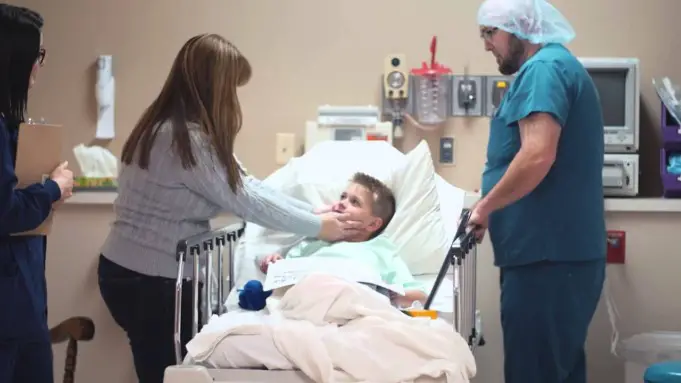Hearing that your child has to go through surgery may be difficult for any parent to process. It is, however, important that you put your fears and concerns aside so you can prepare your child.
Children need a great deal of emotional support in order to get through the whole process. If you express fear or concern around the child then this is how they will react. Calm and patience will help your child be calm and better able to deal with the surgery.
Make sure your body language matches what you say
Kids are smart and if you are standing there clenching your fists with a smile on your face while you are telling them, the child is going to get the “this is serious” message, not the “It’s OK” message.
Research has shown that those kids who were calm before surgery had better outcomes than those who were anxious. It is up to you to set the scene for how they will react. Here are some steps you might want to consider if you have a child facing surgery.
Notification
It is important to tell your child far enough in advance that they will be having surgery. Failure to do so, or surprising them with the surgery will only serve to make you child afraid of the entire healthcare enterprise from then on.
How far in advance you tell them should depend on the age of the child. For younger children you don’t want to tell them too far in advance because the waiting period will drag on.
Usually a couple of days in advance is sufficient time to answer any of the questions they may have. With older children, you will want to give them a little more time so that they will have enough time to have all their questions answered, which may be a little more extensive than the younger child’s.
Older children’s views of the hospital and surgery may be erroneously skewed by what they have seen on TV. If this the case you may want to consider visiting the hospital ahead of time.
Become Informed
It is important that when you talk to your child you do not give them any misinformation. If the child asks you something you don’t know for sure tell them that you will find out and get back to them.
Giving them inaccurate information will only start a seed of mistrust between you and your child especially if things happen differently from what you explained to them.
Ideally you and your spouse should sit down with the surgeon or their assistant and ask questions yourself until you feel that you understand the procedure well.
Take a Tour of the Hospital
Many hospitals and surgery centers have programs where you can bring your child in to familiarize them with what will go on while they are at the hospital. This might be a good thing to take advantage of.
In addition to taking a tour there are some books for kids who are going to have to have surgery. One that I recommend may be found online for free at Cleveland Clinic.
Know The Answers
You should know the answers to the following questions so you can answer them if they come up with your child and also so you and your spouse can ask the surgeon if you have any questions about what they will be doing.
Knowing the answers to these questions will go a long way in helping you help prepare your child. Depending on the type of surgery your child will have there may be other questions you may want to ask.
- Will an IV be started on my child?
- What type of anesthesia will be used?
- Will my child be given any medicine before the anesthesia?
- Will they be awake why the anesthesia is given?
- Will one or both of us be able to go to the OR with them?
- What should I tell my child about the surgery?
- Will they have any bandages or tubes when they wake up?
- How much pain will they be in after surgery?
- How long will they have to be in the hospital?
- Can they eat and drink before surgery?
- What will they be able to eat and drink after surgery?
- Will we be able to stay overnight with them after surgery?
- Will they have to go home with any bandages etc.?
Avoid Some Words
What you say as well as how you say it will affect your child. Here is a list of things you should avoid saying to your child.
- They will give you gas (gas to children is poisonous and not good)
- They will anesthetize you (the kid hears euthanize you)
- They will put you to sleep (gee, didn’t we just put our dog to sleep last year?)
- They will knock you out (they are going to knock me down like they do in the fights?)
- Don’t worry that you won’t wake up (assure them they will sleep thru surgery and then wake up)
- Be a big boy or girl now (Crying or having concerns is to be expected)
- It is just like on TV (It is not just like on TV and to say so is giving them false information)












